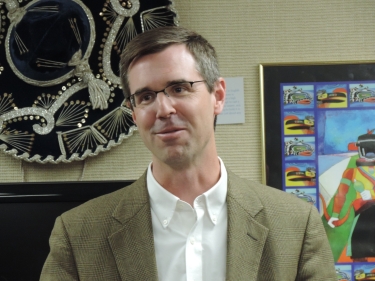by Kelly Rogge
Eric McHenry, the Poet Laureate of Kansas, visited Kansas City Kansas Community College Oct. 29 to share his talent and love of poetry with students, faculty, staff and community members.
“The best poems, for me, are the opposite of page turners, they are page don’t turners,” he said. “When I finish a page of poetry that blows me away, the last thing I want to do is turn the page. I want to stay there with it, re-enter it, and continue digging until I have gotten to the bottom of it. Some of the best poems I know on the surface are the furthest things one can imagine from a page turner.”
McHenry was named the 2015-2017 Poet Laureate of Kansas by the Kansas Humanities Council in April. As poet laureate, he will work to promote the humanities as a public resource in Kansas through appearances, presentations, public readings and discussions throughout the state. His visit to KCKCC was jointly sponsored by the Arts, Humanities and Social Sciences Division; Institutional Services; the KCKCC Library and the Intercultural Center.
One of the poems McHenry recited was “The Bean Eaters” by Gwendolyn Brooks. Born in 1917 in Topeka, Kan., Brooks was the first African American to win a Pulitzer Prize when she was awarded the Pulitzer Prize for Poetry in 1950. McHenry said he had the honor of meeting Brooks in the late 1990s when she visited Washburn University.
Another poem that he shared was “After Apple-Picking” by Robert Frost. He described the poem as “an experience.”
“It is a world we can enter and inhabit. The point of the poem, to me, is its existence,” he said. “This is not to say this is a poem without meanings that we can apply to our own lives and experiences. One of the reasons the poem seems so real, so true, is because it speaks to experiences so many of us have had.”
Known throughout the United States as a poet, McHenry is an associate professor at Washburn University in Topeka, Kan. His work has appeared in a variety of publications including Poetry International and Yale Review. In addition, publications such as the New York Times and Columbia magazine have published his poetry reviews.
His third book of poems, “Odd Evening,” will be published in 2016. He has been nominated for the Pushcart Prize for poetry seven times and is the recipient of the Theodore Roethke Prize. In 2007, he received the Kate Tufts Discovery Award for his first book of poems, “Potscrubber Lullabies.” It is the largest American prize for a first book of poetry.
McHenry said many times when reading poetry, people look to find the meaning. He said looking for that meaning might be an unreasonable to ask of a poem.
“A poem is composed of words. A song is composed of notes, and a painting is composed of paint. But the historical function of paint is not to mean. The historical function of notes is not to mean,” he said. “However, the historical function of language is to mean, to communicate, to express, to convey and to make things clearer. It is a natural human reaction to a poem to say what does it mean. What is it trying to say? I think when you ask those questions, you risk restricting what the poem can be a little too much.”
Kelly Rogge is the public information supervisor for Kansas City Kansas Community College.

